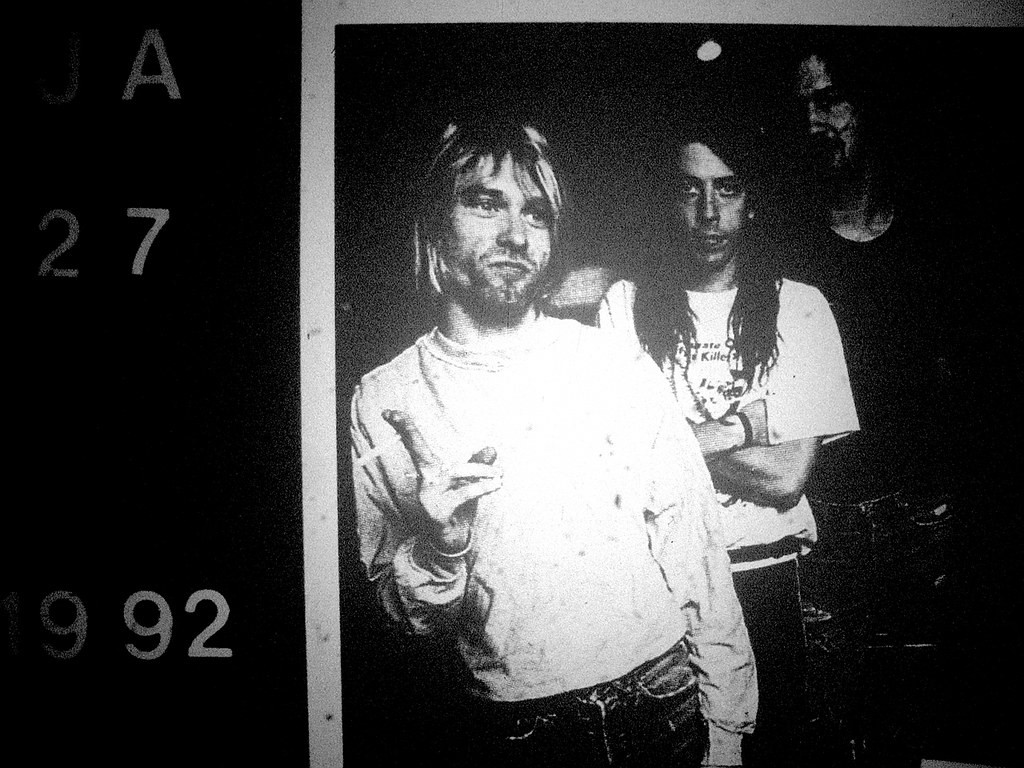Thirty years after its seismic release, Nirvana’s Nevermind continues to resonate, entertain, and provoke. This seminal album didn’t just redefine a genre; it soundtracked a generation’s angst and inadvertently became a global phenomenon. In this exclusive interview, originally conducted by NME and now revisited for its 30th anniversary, surviving Nirvana members Dave Grohl and Krist Novoselic, alongside producer Butch Vig, reflect on the making of Nevermind, the legacy it forged, and the enduring power of Nirvana’s songs to captivate audiences even today.
 Nirvana performing live, Krist Novoselic on bass, Dave Grohl on drums, capturing the raw energy of their music
Nirvana performing live, Krist Novoselic on bass, Dave Grohl on drums, capturing the raw energy of their music
Revisiting Nevermind: Memories from the Studio
Looking back 20 years later, what memories strike you the most about the recording process of Nevermind?
Dave Grohl: Krist and I don’t remember much about the making of Nevermind.
Krist Novoselic: I don’t remember anything.
Grohl: Butch remembers everything. To me, it’s more of a personal landmark. My life was split in two by Nevermind. I don’t remember the making of it, nor the day that it came out. But it caused a profound change in my life. It’s hard to believe that the songs that would become such a massive part of music history, songs that continue to entertain millions, were created in such a blur for us.
How specifically did Nevermind change your life?
Novoselic: At the time, it didn’t seem like that much was changing. We were just inside the rental van that we had on tour. More people started coming to gigs, and slowly the band’s name took on a whole new meaning. But in our own little world, things stayed the same for a while. The shift was gradual, but the impact of Nevermind on our lives and the world of music was undeniable.
What do you make of the 20th anniversary celebrations surrounding the re-release?
Novoselic: It’s nice. Nirvana came from a lot of places. There were other bands that broke ground for us. Jane’s Addiction and Faith No More had alternative rock hits on the radio. The Sunset Strip sound and hair rock thing had played its course out. We helped bring in a new wave of rock, a new wave of punk rock, or at least that sensibility. Nevermind is an accessible record. Those are pop songs with a lot of melody. The production was top notch and people were ready for it. The album tapped into a cultural shift, and its melodic accessibility is a key reason why Nirvana songs continue to entertain and resonate with diverse audiences.
Krist, you’ve previously called it a rite of passage record. Would you agree, Dave?
Grohl: I think so. I was so young when we did it. 22. A fucking kid. Honestly, the one joy in my life was playing in the band. I had no stability or security. I just had Nirvana. So when we came down to Sound City to make the record, I didn’t know what to expect or what was going to happen. I just wanted it to be good. At the time, we just wanted to be one of those bands that played the Palladium and could eat food without pawning our gear. Looking back, it’s amazing to think that something born from such youthful uncertainty could become such a defining and entertaining force in music.
Novoselic: You can’t forget what an artist Kurt Cobain was. He would draw, he would do sculpture, and he would write songs. He was really gifted. On Twitter, or in the street, or from fan mail, I receive notes from people for whom Nirvana changed their life. For me, Flipper and Black Flag had done that. So when someone tells me that, I chalk one up for Kurt. Cobain’s artistry is central to why Nirvana’s music continues to entertain and affect people on a deeply personal level.
Navigating Success and “Selling Out”
You guys came from the punk rock tradition and there were accusations about selling about at the time. How did that make you feel?
Grohl: I never got it.
Novoselic: I got it a little bit, but you have to remember how doctrinaire punk rock was. When I got into punk, there were people burning Led Zeppelin and Black Sabbath records because those were false idols and the new god was punk. And even then, I was like, ‘no, this is good music.’ Whenever we did interviews, we would promote a lot of underground bands like Dinosaur Jr. We did because we loved them, but also to inoculate ourselves from criticism. ‘Yeah, we’re on major label and we’re in the media, but we’re…
Grohl: …”Shouting out the Melvins.”…I never thought that anyone could accuse the band of selling out creatively. The idea that Nirvana, in their pursuit of making music that entertains and connects, could be accused of “selling out” seems absurd in retrospect.
Novoselic: How did we sell out? We had a $260,000 advance about which half went to taxes.
Grohl: And Sub Pop.
Novoselic: Sub Pop commissions. Professional fees, and then we spent it on the record. We were broke.
Grohl: The first thing that happened when I joined Nirvana was that I got sued by a punk rock guy.
What were you sued for?
Grohl: I can’t talk about it publicly, or I’ll get sued again. Some famous old punk rocker dude sued me right out of the gate. It was my introduction to the music industry. I was like if the punk rock guy is suing me, then everyone’s fucked.
Novoselic: That’s what happened. There were a string of lawsuits, even after Kurt had died and Nirvana had ended. All kinds of bullshit.
Grohl: Punks have lawyers too.
Do you feel like the notion of selling out still exists?
Grohl: I don’t believe in guilty pleasures. If you want to make music, you should make music. You can’t judge someone else’s practice or music, if you’re there to do your own thing.
I didn’t start playing music to make millions of dollars or sign autographs. I did it because I loved listening to the Beatles and had a fucking guitar in the house. It’s still the foundation of what I do. The Foo Fighters is basically me making music with my friends and hoping people get off on it. People should be free to do whatever they want to do musically, without fear of selling out. The core principle remains making music that entertains and connects, regardless of external pressures or criticisms.
Novoselic: Pavement made great records and they were staunchly independent. Those philosophical arguments about independent or not, never come into my head. It’s like, ‘do they rock?’
Grohl: It’s fun to have this conversation with Pat Smear because he was in one of the first gnarly punk rock bands in Los Angeles. They were just crazy people who worshipped Alice Cooper, Bowie and Iggy Popp and were taking as many drugs as they could the whole entire time. You think it mattered what record label they were putting it out on? Fuck no, they wanted money for coke. Ask the old punks what they think about that bullshit.
Inside Sound City: The Recording Sessions
Do you remember what the mood was like when you were out here recording the album? Were you guys holed up in the studio all hours of the night?
Grohl: Ask Butch.
Butch Vig: You were in the studio nine to ten hours a day. You’d come in early afternoon, record, take a dinner break, record at night and then split around 9 or 10. I’d stay around and tinker with stuff for a couple hours. The band was super focused. When we went into rehearsals in North Hollywood, there was no slacker ethic. I was amazed at how tight they sounded. I didn’t have re-arrange the songs. Some things we’d tighten up or shorten for a couple bars, but that was it. The focused studio environment was crucial in capturing the raw energy and sonic precision that makes Nirvana’s songs so entertaining and impactful.
Were there fights in the studio?
Grohl: Not one.
Vig: There was no drama.
Grohl: We’d stripped everything down to its most simple form. Three people, short songs, verse chorus verse formula, minimal overdubbing. We’d usually nail the songs in two or three takes.
Vig: Some are first takes. There were only two songs that we struggled to get right: “Lithium” and “Something in the Way.” “Smells like Teen Spirit” was done on the second take. It went fast. Kurt didn’t have a lot of patience. He wanted to get things done in a couple takes or he’d quickly lose interest.
What was Kurt like in the studio?
Vig: That was the hardest thing. You had to deal with Kurt’s mood swings. He could be totally engaged, funny, witty, and focused. But sometimes, a switch would go off, and he’d want to be alone in the corner, not really communicating. After an hour or two, he’d just snap out of it. We just learned to give him his space when he went into a black hole, but we had no idea when that was going to be. Cobain’s unpredictable nature, contrasting with his undeniable talent, contributed to the unique and often emotionally charged quality of Nirvana’s music, which continues to entertain and move listeners.
Do you ever think what direction Nirvana would have gone if Kurt hadn’t died?
Novoselic: Novoselic: You can’t downplay what happened at the end, so that’s a really hard question to answer. It’s just too monumental.
The Enduring Legacy of Nirvana
Nirvana’s Nevermind remains a cultural touchstone, an album whose songs continue to entertain, provoke, and inspire. From the explosive energy of “Smells Like Teen Spirit” to the raw vulnerability of “Lithium,” the album’s impact is undeniable. Through their music, Nirvana entertained a generation grappling with change, uncertainty, and a desire for something authentic. Even decades later, the band’s songs haven’t lost their power to connect with listeners, proving that the raw emotion and musical innovation captured on Nevermind are timeless and continue to entertain us.

